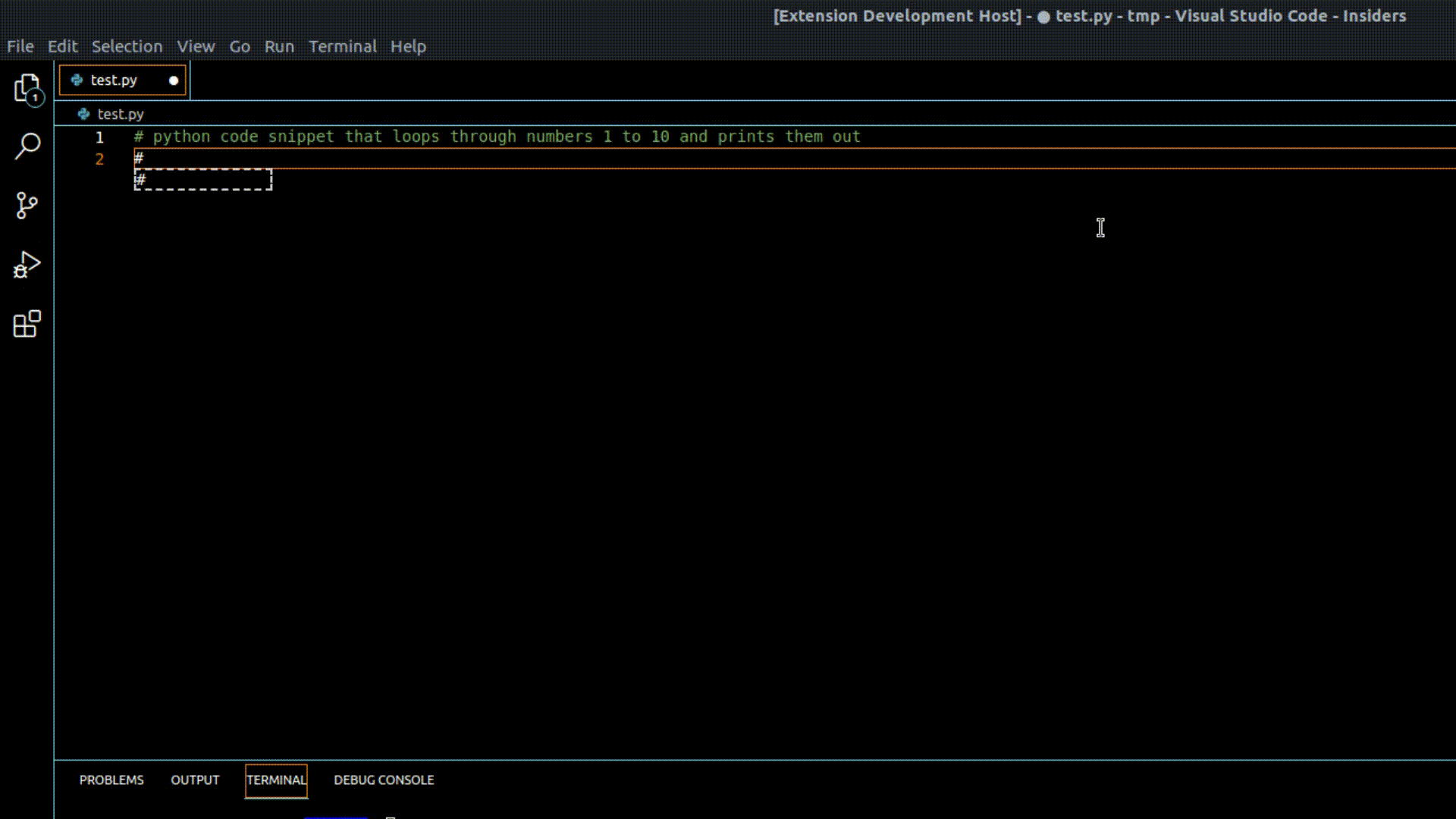GitHub Copilot is probably the best tool to solve all your coding problems, but have you ever considered its alternatives?
In fact, using alternatives would be better for overcoming many shortcomings of GitHub Copilot.
Read on to discover more about GitHub Copilot and some of its worthy alternatives.
Table of Contents Show
What Is GitHub Copilot And How Does It Work?
GitHub Copilot is a code generation tool developed by the collaboration of GitHub and OpenAI, which started in 2021.
It is designed to help developers write code more efficiently by providing intelligent suggestions and completing code snippets.
Copilot uses OpenAI’s GPT-3 architecture to generate responses, but the reactions are limited to coding activities, including;
- Boilerplate Code: It helps generate templates, so coders need not start a project from scratch.
- Debugging: it can detect coding errors and report them to the user with suggestions.
- Writing Tests: It helps generate test cases and assertions for various functions.
- Complete Code Snippets: It completes missing or incomplete codes based on the code’s context and your requirement.
If you are wondering, Copilot uses a machine learning model trained on a large corpus of open-source code to generate code snippets in various programming languages.
For now, it works as a plugin for Visual Studio Code (an integrated development environment) but as an independent tool.
Watch the video to learn how GitHub Copilot actually works,
Features Of GitHub Copilot
Some of the features that make GitHub Copilot unique include the following.
- Intelligent Code Suggestions: Trained on millions of lines of code, it can suggest context-specific code snippets to speed up the development process.
- Natural Language Support: Copilot can understand natural language input, which is particularly helpful for beginner programmers.
- Auto-Completion: It autocompletes code as written, saving you time and effort.
- Code Review: It helps review code to identify potential bugs or shortcomings.
- Integration With Popular Code Editors: It integrates seamlessly with popular code editors like Visual Studio Code.
- Multi-Language Support: It supports multiple programming languages, including Python, JavaScript, Ruby, and more.
- Customizability: You can customize Copilot’s behavior to suit your preferences or requirement.
Why Look For GitHub Copilot Alternatives?
Although quite helpful, GitHub Copilot is not free from shortcomings.
Here are a few reasons why you should consider GitHubCopilot alternatives.
- Lack Of Quality: GitHub Copilot may generate suggestions but fails to test its code, requiring an expert review.
- Copyright And Security Issues: Copilot may infringe on intellectual property rights and respond with copyright codes without proper licensing, such as from StackOverflow.
- Spoonfeeding: Copilot will code for you but fail to teach you how to solve your issues.
Top 7 GitHub Copilot Alternatives
Here are a few popular recommendations for GitHub Copilot alternatives.
1. Tabine
Tabnine is an AI technology that assists with predicting and suggesting codes based on context and syntax.
Formerly known as Codota, it is among the first code-completing tools which complete code and enables training your private AI model.
Trained with a machine learning algorithm, it helps with a variety of tasks, including;
- Whole line code completions
- Full function code completions
- Natural Language to code
Tabnine and Copilot use AI to suggest codes, so they are not significantly different.
However, Tabnine only uses open-source code with permissive licenses, which Copilot does not.
Here is how Tabnine fares to Copilot.
| Tabnine | Copilot |
|---|---|
| Tabnine offers both a free and a paid plan ($12 /mo). | Copilot only offers a paid plan ($10 /mo and $100 /year). |
| It uses open-source code with permissive licenses and never trained with public model. | It may copy from various online resources, including stackoverflow, posing copyright issues. |
| It offers self-hosting capabilities via VPC or on-premises deployment. | It does not offer self-hosting feature but OpenAI server. |
| It may be limited in completing large chunk of codes or function. | It comes quite handy in completing large chunks of code and even whole functions. |
2. Captain Stack
Captain Stack is an open-source VSCode plugin that combines the features of both Copilot and Stack Overflow and provides relevant code suggestions.
However, Captain Stack uses Google to populate its knowledge base, unlike Copilot, which depends on a large data corpus.

You can easily access the CaptainStack information on Visual Studio Marketplace to learn how to install and use it.
Here is how Captain Stack fares to Copilot.
| Captain Stack | Copilot |
|---|---|
| Captain Stack is completely free for use. | Copilot only offers a paid plan ($10 /mo and $100 /year). |
| It generates knowledge from Google and sites like Stack overflow, GitHub Gist. | It generates knowledge from Stack overflow and GPT database. |
| It is quite updated than GPT's knowledgebase. | Copilot uses GPT-3.5 which is not yet updated. |
3. GPT-Code-Clippy (GTP-CC)
GPT-Code-Clippy (GPT-CC) is an open-source version of GitHub Copilot based on GPT-3 architecture called GPT-Codex.
It was created by EleutherAI, a community-led organization focused on developing large-scale language models.
As an AI assistant tool, it provides code suggestions and completion and performs coding activities based on the data fine-tuned on publicly available code from GitHub.

The code for AI Clippy is written in Python and is based on the Hugging Face Transformers library, which provides an easy-to-use interface for building and training language models.
Because it is trained on GPT-2 and Neo models, it has not been trained on billions of lines of public code and parameters like Copilot.
Here is how GPT-Code-Clippy (GPT-CC) and Copilot differ from each other;
| GPT Clippy | Copilot |
|---|---|
| It is completely free for use. | Copilot only offers a paid plan ($10 /mo and $100 /year). |
| It uses the GPT-2 and Neo model, trained for text generation, sentiment analysis, and Q&A models. | It uses GPT-3 architecture designed as an AI assistant for various tasks. |
| It is an open-source model that anyone can download and use via GitHub or use an a plugin for VSCode extension. | It is only available as a plugin for VSCode extension. |
| The training scripts are based on the Flax Causal Language Modelling script accessible on Huggingface. | The training script lies entirely on GPT architecture with no exclusive access to it. |
4. IntelliCode
Intellicode is a set of AI-assisted development tools created as an experiment by Microsoft.
It aims to improve the productivity and efficiency of developers by providing relevant and accurate coding suggestions.
However, it is trained on selected GitHub projects and is available only as a Microsoft product for Visual Studio.
It applies machine learning algorithms to analyze existing codebases and provide autocomplete suggestions, code snippets, and intelligent code formatting options based on the code’s context.
The most attractive feature of IntelliCode is team completion, which proves beneficial for organizations with a Microsoft-based architecture to collaborate.
Here is how Intellicode differs from GitHub Copilot;
| Intellicode | Copilot |
|---|---|
| It is completely free for use. | Copilot only offers a paid plan ($10 /mo and $100 /year). |
| It is a Microsoft tool that integrates with its own development tools like Visual Studio Code and Visual Studio. | It is a standalone tool that integrates with Visual Studio Code and other code editors through plugins. |
| It uses Microsoft's proprietary code corpus and machine learning models to provide code suggestions. | It is trained on a massive dataset of open-source code available on GitHub. |
| It provides autocomplete suggestions, code snippets, and smart formatting options. | It goes a step further by generating entire lines of code based on context and the task. |
5. CodeGeeX
CodeGeeX is a reliable alternative to GitHub Copilot with its large-scale multilingual code generation model powered by 13 billion parameters.
Using the Candidate feature, you can generate blocks of code, suggestions for code correction, code completion, and multiple versions of the same lines of code.

Overall, it performs similarly to GitHub Copilot and sometimes more in a few aspects.
| CodeGeeX | Copilot |
|---|---|
| Free to verified students, teachers, and maintainers but others mut pay $10 /mo or $100 /year. | Copilot only offers a paid plan ($10 /mo and $100 /year). |
| It is trained on 20 programming languages. | It is trained on a dozen of programming languages. |
| It can generate multiple version of same line of code to avoid risk of plagiarism. | It does not offer multiple choices for the same line of code. |
| It offers four modes with varying features: Stealth, Interactive, prompt, and translation mode. | It only offers one mode to carry out every task. |
6. Code Whisperer
Code Whisperer is a very reliable AI code assistant tool developed by Amazon in 2022 to overcome the shortcomings of previous code assistant tools.
Trained on billions of lines of code retrieved from open source repositories, Amazon repositories, API documentation, and forums such as GitHub, it provides accurate suggestions.
As the term suggests, Code Whisperer deeply understands the codebase they are working on.
It helps bridge the gap between developers and stakeholders by identifying areas of the code that need improvement and providing ML-powered code recommendations.
| Code Whisperer | Copilot |
|---|---|
| During the preview period, developers can use CodeWhisperer at no cost. | Copilot only offers a paid plan ($10 /mo and $100 /year). |
| The code recommendations provided are based on Amazon and open-source code. | The code recommendations provided are based on GitHub and public forums. |
| You can enable Amazon Code Whisperer through the AWS Management Console. | You can download the standalone service or integrate using the plugin for visual editor tool. |
| It works most efficiently when user input is short and directed to discrete tasks so that no single function is too long. | Copilot can take in longer user input to generate custom code, short or long. |
7. Second Mate
Second Mate is a code generation tool designed for Emacs (text editor for the POSIX operating system), which is similar to GitHub Copilot, but as a minuscule version.
It is an open-source; mini imitation of GitHub Copilot designed using EleutherAI GPT-Neo-2.7B exclusively for Emacs.

If you are wondering, it can become a fantastic tool for beginners to play around with as it offers prompt code responses using the same resource as the Copilot.
| Second Mate | Copilot |
|---|---|
| Second mate is completely free for use. | Copilot only offers a paid plan ($10 /mo and $100 /year). |
| It is a mini version of Copilot powered by GPT-2 architecture. | It boasts large corpus of data from GitHub and public forums and is powered by GPT-3 technology. |
| It can provide a good headstart for getting used to code assistant tools. | It is a robust version appropriate for programmers, researchers, students, and others. |
| It is only appropriate for users running Emacs. | It is appropriate for most visual editor tools. |
The Bottom Line
Code assistant tools are essential to everyday programming because they help overcome many shortcomings.
From improving code quality, maintaining consistency, and analyzing to collaborating, they help increase your overall productivity.
However, be wary about choosing a paid or free service based on your project requirement, budget, and assistance needed.
Frequently Asked Questions
What Programming Languages Does Copilot Specialize In?
Currently, Copilot supports several popular programming languages, including Python, JavaScript, TypeScript, Ruby, Go, and Rust.
Can You Customize Copilot’s Suggestions?
Currently, Copilot does not offer a way to customize its suggestions directly.
However, users can now create their code snippets and libraries to complement Copilot’s suggestions.
What Makes Other Code Assistant Tools Better Than Copilot?
Copilot does not yet support many languages nor provides integration with a user-preferred environment, which limits it to a few other code assistant tools.


